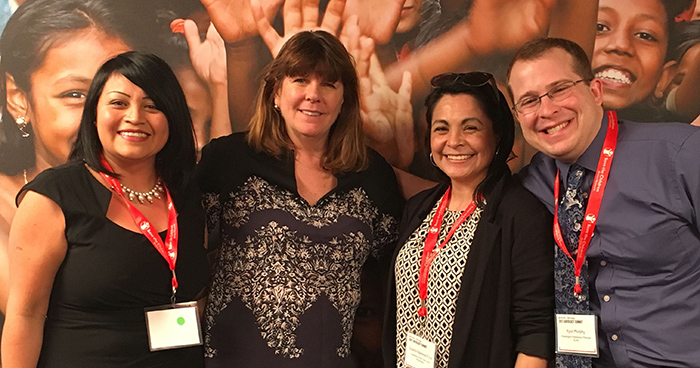
Leslie Brown (second from left) poses with other SCAN volunteers and Associate Director for Mobilization Ryan Murphy (right).
It’s another important election year, especially in Washington State.
In 2016, the election was profoundly affected by the large numbers of people who didn’t vote. It’s most assuredly true that those same people have families: children, sisters, brothers, nieces and nephews, and want what’s best for them. So why didn’t they vote?
It is likely that many of those people do not fully understand that choosing government representatives through voting has a deep, direct impact on our children and their futures.
I moved to Washington State a few years ago to be closer to my three nieces and their children. I have no children of my own, but I have 12 nieces and nine nephews.
My nieces have small children and I was involved in helping care for them every week. That’s when I started learning about quality pre-school and the critical brain development that occurs between 0 and 5 years of age.
Just recently, the smallest of these children – two and a half years old – started attending pre-school. I am very happy that my niece and her husband have the means and the knowledge that early learning is the best way to prepare children for success in life.
Unfortunately, not every family does.
When I started working with Save the Children Action Network (SCAN), I realized that politicians may not consider children in decisions about funding early childhood education initiatives simply because children don’t vote. That’s why it’s critical that we use our voice for kids!
I feel strongly that all children in Washington State should have the same opportunities as the children in my family. The best way to ensure this is to elect politicians whose records show they understand the critical importance of quality pre-school programs. That means that we, the people, have to secure our children’s futures with our votes.
Good, caring people will not run for office if they believe the community doesn’t care enough to vote. We have to show up and vote for the candidates who share our values and will reflect those priorities in policies and budget decisions. When we don’t vote, the people who are elected do not represent the greatest number of people; instead they represent the special interests of the minority.
Voting is important as a way to tell our government what kind of country we want to be. It is our responsibility and our duty, not only to vote, but to encourage our friends, families, and neighbors to also vote.
If we are going to assure equitable access to early learning here in Washington, we have to vote for politicians who are committed to the idea that our future lies in our children, and who will help create the best education opportunities for them, in an equitable and accessible education system, from pre-K through college and trade schools.
Our future depends on it!
Editor’s Note: This blog is part of a series highlighting why it’s important to vote in the midterm elections, written from a state-by-state perspective. Check out the blogs from Colorado, South Carolina, Ohio, Iowa and Tennessee!